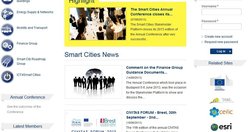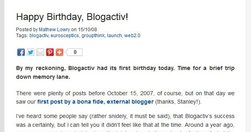Filter 930 resources:
- community (213)
- content strategy (194)
- curation (136)
- social media (130)
- media (105)
- news (96)
- content marketing (84)
- content (76)
- strategy (66)
- communications (62)
- metrics (56)
- facebook (55)
- comments (50)
- eu (43)
- marketing (43)
- promotion (43)
- ai (42)
- journalism (39)
- engagement (39)
- storytelling (38)
- ocm (36)
- audience research (36)
- innovation (35)
- publicsphere (32)
- multilingualism (32)
- design (29)
- bloggingportal (29)
- psychology (26)
- authenticity (26)
- propaganda (24)
- disinformation (24)
- longform (23)
- blogging (23)
- myhub (22)
- algorithm (22)
- tool (22)
- productivity (21)
- participation (20)
- online architecture (20)
- web (20)
- science (20)
- medium (19)
- video (18)
- trust (18)
- ux (18)
- management (18)
- internal communications (17)
- enewsletter (17)
- troll (17)
- persuasion (17)
- twitter (17)
- influence (16)
- knowledge management (16)
- filter bubble (15)
- data (15)
- semantic (14)
- brand (14)
- newsletter (14)
- organisation (14)
- advertising (14)
- blog (14)
- information architecture (13)
- messaging (13)
- web design (13)
- k4p (13)
- bluesky (13)
- atprotocol (12)
- podcast (12)
- audiovisual (12)
- linkedin (12)
- ai4communities (12)
- politics (11)
- conversation (11)
- mobile (11)
- fediverse (11)
- europcom (11)
- bloggingportal2 (11)
- science journalism (10)
- democracy (10)
- creativity (10)
- personal (10)
- digital transformation (10)
- seo (10)
- conspiracy (9)
- newsroom (9)
- moderation (9)
- web20 (9)
- information (9)
- evidence-based policy (9)
- persona (9)
- bot (8)
- llm (8)
- social marketing (8)
- analytics (8)
- gtd (8)
- nytimes (8)
- design thinking (8)
- event (8)
- ec (8)
- optimisation (8)
- native advertising (8)
- science communication (7)
- theme (7)
- zettelkasten (7)
- clickbait (7)
- factchecking (7)
- identity (7)
- editorial (7)
- collective intelligence (7)
- cards (7)
- business model (7)
- crowdsourcing (7)
- 2ndbrain (7)
- cognitive (6)
- interactive (6)
- polarization (6)
- groupthink (6)
- platform (6)
- explainer (6)
- stream (6)
- machine translation (6)
- outreach (6)
- realtime (6)
- mastodon (6)
- us (6)
- startup (6)
- culture (5)
- intranet (5)
- euractiv (5)
- yanss (5)
- future (5)
- agile (5)
- viral (5)
- google (5)
- employee engagement (5)
- gamification (5)
- project management (5)
- data journalism (5)
- visual (5)
- brussels bubble (5)
- decentralised (5)
- tribe (5)
- covid19 (5)
- instagram (5)
- app (5)
- headline (5)
- hr (4)
- privacy (4)
- training (4)
- policy (4)
- drupal (4)
- machine learning (4)
- visualisation (4)
- backfire effect (4)
- ewrc2017 (4)
- game (4)
- chat (4)
- coral (4)
- trump (4)
- andy matuschak (4)
- fbpaper (4)
- guide (4)
- eurosceptics (4)
- leadership (4)
- sublime (4)
- vandenbrande (4)
- pr (4)
- chatgpt (4)
- top3pods (4)
- moments (4)
- us2020 (4)
- google analytics (4)
- buzzfeed (4)
- cms (4)
- collaboration (4)
- meaning (3)
- sceptic (3)
- survey (3)
- google+ (3)
- paper (3)
- regulation (3)
- atomisation (3)
- memex (3)
- rebelmouse (3)
- roi (3)
- mooc (3)
- snapchat (3)
- semanticweb (3)
- html5 (3)
- faceted search (3)
- themes (3)
- blogpocalypse (3)
- faq (3)
- email (3)
- disruption (3)
- transparency (3)
- uk (3)
- search (3)
- confirmation bias (3)
- jobtodo (3)
- lobby (3)
- mvp (3)
- presentation (3)
- atproto adoption (3)
- bbc (3)
- infographic (3)
- bxlsbbl (3)
- euroblog (3)
- reddit (3)
- wikipedia (3)
- mybot (3)
- ui (3)
- wiki (3)
- slack (3)
- politicoeu (3)
- crm (3)
- responsive (3)
- echo chamber (3)
- qanon (3)
- europa (3)
- open source (3)
- education (3)
- buffer (3)
- letters2eu (3)
- threads (2)
- addiction (2)
- narratives (2)
- eparltv (2)
- goals (2)
- big data (2)
- example (2)
- debunk (2)
- planning (2)
- hbr (2)
- mobocracy (2)
- personalisation (2)
- kpi (2)
- evolution (2)
- expert (2)
- open web (2)
- motivated (2)
- screencast (2)
- usp (2)
- quora (2)
- governance (2)
- lean canvas (2)
- consultancy (2)
- free (2)
- gawker (2)
- basic (2)
- wisdom (2)
- eurocrap (2)
- cultural exchange (2)
- curatorbot (2)
- conference (2)
- co-creation (2)
- credibility (2)
- automation (2)
- ideation (2)
- blogger (2)
- livestream (2)
- pilot (2)
- russia (2)
- ltinnovate2016 (2)
- multimedia (2)
- transmedia (2)
- bookmark (2)
- ea (2)
- sponsored content (2)
- annotate (2)
- posse (2)
- tv (2)
- usability (2)
- loyalty (2)
- magazine (2)
- substack (2)
- machine text (2)
- vox (2)
- english (2)
- copyright (2)
- dissonance (2)
- notification (2)
- framework (2)
- brexit (2)
- circa (2)
- media literacy (2)
- product/market fit (2)
- sensemaking (2)
- integrated (2)
- attentionweb (2)
- obsidian (2)
- cambridge analytica (2)
- signal2noise (2)
- crowdculture (2)
- ft (2)
- euractiv-com (2)
- integrate (2)
- khub (2)
- syndicated-translation (2)
- infopocalypse (2)
- signaltonoise (2)
- knowledge visualisation (2)
- knowledge graph (2)
- useful (2)
- vine (2)
- dao (2)
- slideshare (2)
- guardian (2)
- europe (2)
- canonical debate lab (2)
- massive.wiki (2)
- gender (2)
- twitter migration (2)
- statistics (2)
- pitch (2)
- usa (2)
- ai prompt (2)
- agent (2)
- change (2)
- instant articles (2)
- eurosceptic (2)
- nuzzle (2)
- sari azout (2)
- listicle (2)
- river4 (2)
- image (2)
- seenthis (2)
- whitewind (2)
- blacksky (2)
- klout (2)
- interface (2)
- eurosky (2)
- expertise (2)
- technology (2)
- sovereignty (2)
- animation (2)
- aggrefilter (2)
- meta (1)
- llama2 (1)
- centaur (1)
- ai-agent-gpt (1)
- reference frame (1)
- quit (1)
- douglas rushkoff (1)
- experiment (1)
- sensecraft (1)
- jeff jarvis (1)
- cory doctorow (1)
- joan westenberg (1)
- gpt-4o (1)
- synthesise (1)
- anuj ahooja (1)
- pluriverse (1)
- vsop (1)
- pubhub (1)
- robert putnam (1)
- idpi (1)
- model collapse (1)
- talia stroud (1)
- eli pariser (1)
- bluesky custom feeds (1)
- bryan newbold (1)
- sill (1)
- open social (1)
- atprotocol lexicon (1)
- purity spiral (1)
- mike masnick (1)
- free our feeds (1)
- robin berjon (1)
- cocomo (1)
- altmetric (1)
- cosmik (1)
- at4democracy (1)
- renee diresta (1)
- middleware (1)
- semble (1)
- wef (1)
- ai reasoning (1)
- claude code (1)
- gdpr (1)
- simon willison (1)
- futurism (1)
- blockchain (1)
- humour (1)
- map (1)
- virtual reality (1)
- powerpoint (1)
- humility (1)
- society (1)
- nlp (1)
- cmv (1)
- reality (1)
- minimalist (1)
- populism (1)
- conversational (1)
- business (1)
- garden (1)
- compass news (1)
- stack overflow (1)
- bias (1)
- china (1)
- infowar (1)
- augmented reality (1)
- computational propaganda (1)
- memory (1)
- polbot (1)
- sentiment analysis (1)
- risk (1)
- wikitribune (1)
- ethics (1)
- government (1)
- quiz (1)
- vote (1)
- gds (1)
- ubi (1)
- purpose (1)
- intro (1)
- ipr (1)
- software (1)
- spambot (1)
- misinform (1)
- writing (1)
- crowdfunding (1)
- egovernment (1)
- pay4content (1)
- hate (1)
- outrage (1)
- web development (1)
- it (1)
- dunning-kruger (1)
- online (1)
- partisan (1)
- tourism (1)
- perception (1)
- hoax (1)
- storyline (1)
- data visualisation (1)
- local (1)
- scrollytelling (1)
- climate (1)
- mindfulness (1)
- open data (1)
- dialogue (1)
- facebook live (1)
- commonplace (1)
- assimilation (1)
- biased assimilation (1)
- censorship (1)
- snowfall (1)
- coda (1)
- euro (1)
- entrainment (1)
- paywall (1)
- library (1)
- logo (1)
- periscope (1)
- slideshow (1)
- discourse (1)
- freelancer (1)
- impact (1)
- quartz (1)
- fomo (1)
- amp (1)
- user (1)
- newsfeed (1)
- playbook (1)
- resources (1)
- wapo (1)
- christensen (1)
- toptask (1)
- silos (1)
- liquid democracy (1)
- publishing (1)
- feed (1)
- jelly (1)
- data enrichment (1)
- solutions journalism (1)
- peakbot (1)
- radicalisation (1)
- explanatory (1)
- whatsapp (1)
- documentary (1)
- viber (1)
- upday (1)
- samsung (1)
- line (1)
- centralised (1)
- membership (1)
- smartcities (1)
- bitcoin (1)
- homepage (1)
- assist (1)
- monetisation (1)
- isis (1)
- plagiarism (1)
- work (1)
- mediumform (1)
- terrorism (1)
- essena (1)
- litmus (1)
- keyword (1)
- guru (1)
- polls (1)
- soonfeed (1)
- guidelines (1)
- fuego (1)
- rss (1)
- routine (1)
- slidecast (1)
- zapier (1)
- digg (1)
- #ilooklikeanengineer (1)
- ssi (1)
- economics (1)
- networking (1)
- bioethics (1)
- publication (1)
- b2b4me (1)
- nasa (1)
- context (1)
- api (1)
- ep (1)
- australia (1)
- traffic (1)
- audio (1)
- ecosystem (1)
- storyboard (1)
- energy (1)
- eci (1)
- briefing (1)
- inception (1)
- bandwagon (1)
- photography (1)
- adaptive content (1)
- scraping (1)
- cardsort (1)
- trove (1)
- wearable (1)
- specialist (1)
- ello (1)
- bureaucracy (1)
- surveillance (1)
- fail (1)
- content partnership (1)
- yahoo (1)
- campaign (1)
- buzz (1)
- wordpress (1)
- abtesting (1)
- heart (1)
- portal (1)
- forum (1)
- archive (1)
- wayback (1)
- taxonomy (1)
- content shock (1)
- length (1)
- cpms (1)
- ecas (1)
- register (1)
- adaptive (1)
- liquid (1)
- casestudy (1)
- benchmarking (1)
- chinese (1)
- listen (1)
- upworthy (1)
- ektron (1)
- python (1)
- skills (1)
- expiration (1)
- values (1)
- ombudsman (1)
- citizenship (1)
- publicsector (1)
- white papers (1)
- kickstarter (1)
- workflow (1)
- trello (1)
- convert (1)
- cro (1)
- chipotle (1)
- newsana (1)
- newscred (1)
- muckread (1)
- altruism (1)
- cookies (1)
- belgium (1)
- video_conferencing (1)
- social (1)
- blogactiv (1)
- messenger (1)
- osmo (1)
- meta ventures (1)
- language technology (1)
- learn (1)
- help (1)
- hangout (1)
- ugc (1)
- stanbol (1)
- apache (1)
- rebut (1)
- prezi (1)
- epale (1)
- opencalais (1)
- structure (1)
- programme (1)
- scale (1)
- roaming (1)
- ip (1)
- nhscitizen (1)
- visualization (1)
- (1)
- green (1)
- ebook (1)
- employeeengagement (1)
- eu09vs19 (1)
- evidence (1)
- jtbd (1)
- micro.blog (1)
- indieweb (1)
- bertelsmann (1)
- bookmarklet (1)
- elaboration (1)
- aspire (1)
- post-alpha (1)
- alpha phase (1)
- saas (1)
- hosted (1)
- presseurop (1)
- data4policy (1)
- blackpr (1)
- cofoe (1)
- newsguard (1)
- sapiens (1)
- apocalypse (1)
- deep fake (1)
- syllabus (1)
- wikinews (1)
- research (1)
- lobbying (1)
- bundle (1)
- imposter syndrome (1)
- inclusion (1)
- gpt-x (1)
- deep canvassing (1)
- delegitimise (1)
- activitypub (1)
- flicc (1)
- ginsburg (1)
- suppress (1)
- participatory culture (1)
- adversarial interoperability (1)
- gab (1)
- blocklist (1)
- hxc (1)
- early adopter (1)
- bridge (1)
- bridgit (1)
- clubhouse (1)
- spaced repetition (1)
- mental health (1)
- arg (1)
- cookiepocalypse (1)
- flipboard (1)
- fedwiki (1)
- stacked note (1)
- cozyweb (1)
- cluetrain (1)
- tools (1)
- programmes (1)
- rebuttal (1)
- lisp (1)
- yellow-card (1)
- life-in-belgium (1)
- infosociety (1)
- eparticipation (1)
- learning (1)
- monitoring (1)
- collaborate (1)
- comment (1)
- nft (1)
- notion (1)
- ostrom (1)
- cooperatives (1)
- snapshot (1)
- multisig (1)
- d2d (1)
- reading queue (1)
- note (1)
- procrastination (1)
- 3p framework (1)
- d3 (1)
- subconscious (1)
- fotl (1)
- betaworx (1)
- conference report (1)
- gordon brander (1)
- resilience (1)
- agora (1)
- flancian (1)
- pattern language (1)
- plexus (1)
- intimacy (1)
- ma parent (1)
- hyperknowledge (1)
- harvest (1)
- perplexity.ai (1)
- nat eliason (1)
- digital garden (1)
- data union (1)
- disco (1)
- startupy (1)
- llama (1)
- autogpt (1)
- thought leadership (1)
- sales (1)
Relevant Overviews
- Communication Strategy
- Content Strategy
- Online Strategy
- Online Community Management
- Social Media Strategy
- Content Creation & Marketing
- Online Architecture
- Digital Transformation
- Change & Project Management
- Communications Tactics
- Psychology
- Social Web
- Media
- Politics
- Communications Strategy
- Science&Technology
- Business
Overview: Communications Strategy
Relevant resources
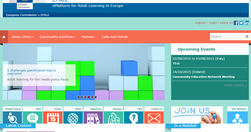
I won the epale online community of practice project and steered its inception phase. Years later, it is still one of the EC's most successful online communities, notably by its ambitious multilingualism strategy and high userbase, despite lacking any financial rewards for participation.

Have you read a great investigative story lately? Anyone can pitch a story, video, graphic or other news link by Tweeting us with #MuckReads
The ever-excellent For Immediate Release (episode 638) put me onto 10 things you still need to know about social media / social business, by Olivier Blanchard (aka the Brand Builder), which sounds like every other post you've ever hear of. But it's worth a read...
Last year, in the runup to the first EuropCom conference, I gave it a bit of a hard time. My cynicism was confirmed by many I knew who went, describing it as a conference about Web2 and social media which allowed little or no participation. Oops.
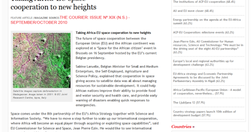
Migrating and relaunching the ACP Courier magazine website using semantic analysis and launching two community-oriented Programme websites for the ACP Secretariat.
The subject of Klout has come up a few times on Twitter, so I'm posting this so I can point people toward a few articles I've found useful. Something I can't do in 140 characters. Which proves my eventual point.
This is the sort of post which could get me into trouble for a number of reasons. Particularly as I'm going to comment on the celebrations to be enjoyed next month at the Festival of Europe, where one can do everything from "seeing the political groups at work inside the European Parliament" to "experiencing a fest…
I've finally gotten around to updating my avatars here and there to show my support to Benoit Poelevoorde's call earlier this year to stop shaving. Why? And why won't it help solve Belgium's political crisis? And what's this got to do with Europe? I don't tend to write much about Belgian affairs ...
A while ago I posted the idea that EUROPA could suffer if the EU Institution's limited online communications resources were refocused on social media. While social media offers the EU a great deal, this could be a serious problem, particularly given EUROPA's importance to any EU social media strategy. Commenters seemed to both agree and disagree...
If I recall correctly, a lot of us in the euroblogosphere reacted to the announcement of the European Public Communication Conference and Network (EuropCom) with a mixture of scepticism, hope and amusement, particularly with the original launch video, which was so badly done I for one was actually charmed.
The lack of specialists in EU-oriented blogs is impeding the development of the European online public space.
Any survey which lists my blog as a Top 20 'influential' blog (see Stuart's post and interview with the authors, and Jon's post) must be either very generous or not have more than 20 blogs to work with
That's right - curation. Now officially Web2.0-buzzword-of-the-month (not quite sure which one).
So the debate about the Euroblogosphere, or the Eurosphere, or the European Public Sphere, or web2eu, or the European online public space, of whatever-we-call-it-next-week, has sparked again into life, like a Frankensteinian monster with dodgy spark plugs screwed into the base of its neck.
One of the topics I've been developing on this blog for quite some time came up at last week's get-together organised by the Belgian IABC chapter: the need (or not) for social media guidelines for EU staff.
A Twitter conversation betweentwo much-followed EU-oriented bloggers over the weekend caught my eye. I won't identify them as you need to follow them on Twitter to see their tweets.It started when one asked whether anyone out there"still thinks that blogging is in any way likely to have an impact ... why should anyone listen to us? We st…
PR firm interns posting fake reviews about iPhone apps for their clients. Ghost blogging and tweeting by just about everyone, including thought-leaders in social media. Bloggers not disclosing sponsorship. It's just a matter of time before someone poisons the well for EU social media.
Over on Nosemonkey's blog, in yet another debate on the pros and cons of EU membership, Insideur is of the opinion that there is a real gap in the market, that Open Europe has sought but failed to fill, for serious, informed, and therefore constructive criticism of the EU
Constructive discussions generally require good discussion documents. One of the Commission's major contributions to any European online space should therefore be a EUROPA that supports the conversations
Trans-European online Communities of Practice should become a key element in the European online community, but examples so far are few. This post looks at DG INFSO, which has been using online community principles since 2002, two years before the phrase "Web 2.0" was invented.
Now and then the question arises: how can we get a transnational discourse on European topics underway, or create a European online public space? The two phrases in bold, above, both come from one of the latest posts on the topic, this time from Julien Frisch. They follow initiatives like Steffan's Bloggingportal.eu, which aggregates Euroblog…
Quite a few people look at me in quite a puzzled way when I mention how the techniques and approaches of online community management 'may have something to offer' the EU in terms of communications, but that this may require 'a change in mentality'. When they look like that, I say "You know, something along the lines of the…
Following rapid and significant expansion into new markets and sectors of governance and policy, innovative union of nation states ("European Union", or EU) seeks an experienced Online Community Manager to gain buy-in at all levels throughout our 27 Members, as well as with external stakeholders on a global level.
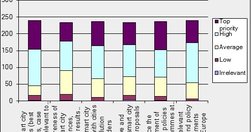
When you want to create a community, asking uses what they need is the best way to start. We launched the 1-page website, with user survey, newsletter signup and social, inside two weeks of winning the project. Everything we developed the following year (2010) was based on the results.
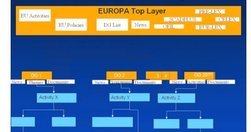
Project manager and architect of a successful pilot to reorganise EUROPA along thematic lines, so people could figure out What the EC did, Why and How, in areas of interest to them, without studying its labyrinthine internal structure.
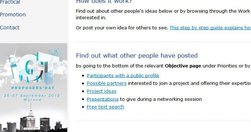
Of course, when we launched the first interactive website for the IST Event (IST 2002) we didn’t know it was a Web2.0 site. That term only appeared two years later
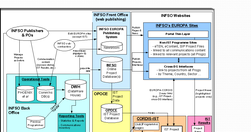
The comm strategy for DG Information Society revoled around a segmentation of the target audience based on their level of interest in - and hence understanding of and motivation to visit/read/learn/share - the work of the DG.
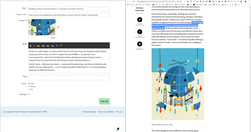
Whenever you see something you want to Hub, just select some text and click the ‘bookmarklet’ button you’ve dragged onto your Browser’s toolbar.
Loading more...
Relevant Overviews
- Communication Strategy
- Content Strategy
- Online Strategy
- Online Community Management
- Social Media Strategy
- Content Creation & Marketing
- Online Architecture
- Digital Transformation
- Change & Project Management
- Communications Tactics
- Psychology
- Social Web
- Media
- Politics
- Communications Strategy
- Science&Technology
- Business
